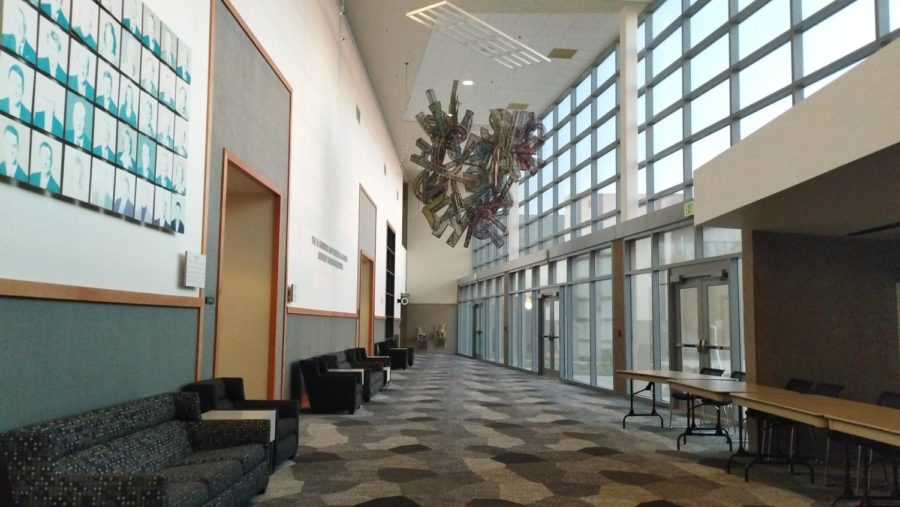Your donation will support the student journalists of Northern Kentucky University. Your contribution will allow us to purchase equipment and cover our annual website hosting costs.
The Board of Regents met this Wednesday, March 15 in the Student Union ballroom.
Shrinking faculty, finances of parking, dining, Truist Arena discussed at board meeting
March 16, 2023
The Board of Regents saw updates on Northern Kentucky University’s Reposition Plan, its effects on faculty and the budget, and the status of auxiliary services at their meeting this week.
NKU has vacated or planned to vacate 49 tenure or tenure-track full-time faculty positions, 35 non-tenure-track faculty positions and two senior administrative positions in the provost’s office. At the same time, the university has approved searches for 13 tenure positions and 25 non-tenure-track positions, according to Provost and Vice President for Academic Affairs Matt Cecil.
As of December 2022, these changes have added approximately $3 million to budgetary reductions or salary savings, at the cost of increasing class sizes and workload for remaining faculty members. All non-tenure-track faculty who are not being renewed will be notified by March 31.
The vacated tenured and tenure-track positions may include 24 out of the 34 applications that have been approved for the Faculty Voluntary Separation Program. If all of the approvals are accepted, NKU can anticipate $2.2 million in one-time costs—incentives for faculty to leave their positions—and $2 million in savings. Final decisions are due March 25.
Jeremy Alltop, vice president for Finance & Administration and chief financial officer, reported that NKU has cut $20.3 million in recurring spending and $3.6 million in one-time spending, relocated $1.5 million in recurring and $11.5 million in one-time expenses to different areas, and avoided spending more than $3 million for any one-time amount. Overall, the Reposition Plan has saved the university over $40 million or 15% of the budget over the 2023 fiscal year.
Alltop then delved into parking, one of NKU’s auxiliary services or self-supporting businesses within the university. The number of student parking permits have fallen from over 6,000 permits purchased in 2017 to around 4,500 in the current fiscal year, a shift attributed to limited parking demand as more students move online—one-third of NKU students are now fully online, and over half of offered credit hours are for online courses, according to Provost Cecil.
NKU receives no state funding for parking services, so any required maintenance must be funded by revenues, and all cash reserves have been exhausted. Debts from construction of the three parking garages remain a burden, Alltop said, but they are expected to be paid off by 2028-2029.
Regent Ken Perry called the financial decisions around parking “a book-balancing gimmick that needs to change.” He reasoned that NKU had excess funds to approve of these decisions years ago, but now with no state funding to take care of deferred maintenance nor cash reserves, parking still continues to transfer money to the general fund.
“Please figure out how you’re going to fix it. I understand that you have to transfer it somewhere else, but the bottom line is we’re not bringing in the money,” Perry said. “This is just the kind of bookkeeping that allowed us to get into this situation we’re in today.”
The second auxiliary is food and beverage services, all capital expenditures for which are provided by a contract with Chartwells that runs through June 30, 2029. However, NKU still made capital investment in 2022 to renovate Einstein Bros Bagels in Steely Library, contributing to a total net loss of $1.19 million.
Along with a drop of 400 residential meal plans in 2022 compared to five years prior, Alltop called into question whether the presence of two residential dining locations—Norse Commons and Callahan Bistro—is needed.
Alltop also included Truist Arena in the report, though it was never set up as a true auxiliary. The arena’s construction came through state and private funding, thus leaving NKU with no outstanding debt. The university still pays for annual operating expenses, with $2.6 million in 2022.
Regent Nathan Smith took issue with the low amount of revenue generated from entertainment events at the arena like concerts, and debated with Alltop on removing such events entirely from the arena’s programming to focus only on sports games.
Losses would be even higher if the arena only had athletics as money from outside events subsidizes NKU’s use of the facility, Alltop argued. Corporate events would be even more lucrative than entertainment events, especially with NKU situated fairly close to Cincinnati/Northern Kentucky International Airport (CVG), but the competition for venues is fierce and organizers routinely face scheduling difficulties.
The arena will turn 20 years old within the next few years and is in need of maintenance, but NKU currently does not have the operating funds to make major capital investments in the facility, Alltop said. He believes that the money made from the arena’s naming rights could potentially subsidize these investments.

